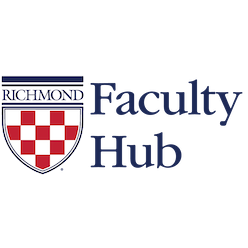I am honored to be writing the introduction for this first newsletter of the academic year, just a few weeks after I began my new position as the Director of the Faculty Hub. Since my arrival on campus, it’s become clear that the progress and accomplishments of the Faculty Hub under the leadership of Linda Boland with her dedicated and talented team of faculty developers—Kylie Korsnack, Andrew Bell, and Libby Gruner—and our coordinator—Jane Bise—have been nothing short of remarkable. Just as remarkable is the fact that the Faculty Hub was created through the efforts and engagement of University of Richmond faculty and the support of the University’s leadership.
The 2019 Teaching and Scholarship Initiative (TSI) committee report offered a vision for the Faculty Hub as “a focal point for campus-wide efforts to support student learning and scholarly and creative work through faculty development.” The visual metaphor put forward in the TSI report, that of a focal point, implies that the Faculty Hub is a place to look to for support, which it very much is. But it’s also a real place, a real point on the campus map. The Faculty Hub is your space, and we hope you’ll come here to take part in our programming, have a consultation with our staff about your scholarship or teaching, and utilize our workstations and teleconferencing spaces. The Faculty Hub is also a great place to gather with colleagues, hold committee meetings, find a quiet corner for writing or grading, or pick up a book from our lending library.
As the Faculty Hub builds on its strong foundation for faculty development on campus, we are committed to ensuring that we continue to support you effectively. I am most excited to get to know you, the faculty at University of Richmond, and to understand how the Faculty Hub can contribute to improving your professional life. I invite you to stop by the third floor of Boatwright Library at your convenience or to make an appointment to chat in person about anything that’s on your mind. We welcome your suggestions and involvement in our programs, and we’d love to find opportunities for you to come and share your expertise with your colleagues.
This newsletter provides a sneak peek of our fall programs. We’re starting the year with some offerings to support you as you return to campus, notably with upcoming Morning Blend sessions on aligning your time with your priorities. We’ve also bolstered our writing support this semester to help keep you on track with your goals. In addition, we’ll have two faculty cohorts that might be of interest—first a semester-long Inclusive Pedagogy Cohort, and next, the Digital Pedagogy Cohort, whose focus will be on experimenting on how to leverage an LMS (learning management system, i.e., Blackboard) in your classes.
For many of us, the beginning of the academic year, more than January 1 or the first day of spring, can represent a time for new beginnings. This year, in particular, the return to campus will be a time of coming together, reconnecting with colleagues and the campus community, and encountering a new generation of students—with all the promise and challenge that will bring. That being said, it’s important to acknowledge that the past few years have altered our annual rhythm dramatically and have brought change, stress, grief, and loss. Many of us are experiencing those mixed emotions as we prepare for this new academic year, and I hope that we will all tread lightly and gently as we return to campus with a renewed sense of the importance of connection and community support.
Kitty Maynard
Director of the Teaching and Scholarship Hub
Read the full newsletter here to catch up on upcoming events and check out some useful resources.
